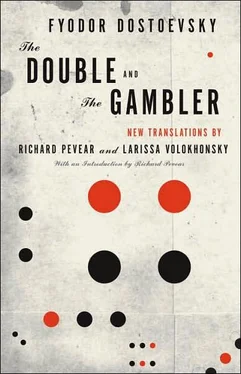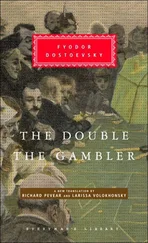Fyodor Dostoevsky - The Gambler
Здесь есть возможность читать онлайн «Fyodor Dostoevsky - The Gambler» весь текст электронной книги совершенно бесплатно (целиком полную версию без сокращений). В некоторых случаях можно слушать аудио, скачать через торрент в формате fb2 и присутствует краткое содержание. Жанр: Классическая проза, на английском языке. Описание произведения, (предисловие) а так же отзывы посетителей доступны на портале библиотеки ЛибКат.
- Название:The Gambler
- Автор:
- Жанр:
- Год:неизвестен
- ISBN:нет данных
- Рейтинг книги:4 / 5. Голосов: 1
-
Избранное:Добавить в избранное
- Отзывы:
-
Ваша оценка:
- 80
- 1
- 2
- 3
- 4
- 5
The Gambler: краткое содержание, описание и аннотация
Предлагаем к чтению аннотацию, описание, краткое содержание или предисловие (зависит от того, что написал сам автор книги «The Gambler»). Если вы не нашли необходимую информацию о книге — напишите в комментариях, мы постараемся отыскать её.
The Gambler — читать онлайн бесплатно полную книгу (весь текст) целиком
Ниже представлен текст книги, разбитый по страницам. Система сохранения места последней прочитанной страницы, позволяет с удобством читать онлайн бесплатно книгу «The Gambler», без необходимости каждый раз заново искать на чём Вы остановились. Поставьте закладку, и сможете в любой момент перейти на страницу, на которой закончили чтение.
Интервал:
Закладка:
At dinner I was again in an agitated state, just as three days ago. The Frenchman and Mlle Blanche were again dining with us. It turned out that Mlle Blanche had been in the gaming rooms that morning and had seen my exploits. This time she talked with me somehow more attentively. The Frenchman was more straightforward and simply asked me if I had really gambled away my own money. It seems to me he suspects Polina. In short, there’s something there. I lied at once and said it was my money.
The general was extremely surprised: where had I gotten so much money? I explained that I had begun with ten friedrichs d’or, that six or seven wins in a row, doubled, gained me five or six thousand guldens, and that I had then lost it all in two turns.
All that, of course, was probable. While explaining it, I looked at Polina, but could make out nothing in her face. However, she let me lie and did not correct me; from that I concluded that I did have to lie and conceal that I was playing for her. In any case, I thought to myself, she owed me an explanation and this morning had promised to reveal something or other to me.
I thought the general would make some remark, but he kept silent; instead I noticed worry and uneasiness in his face. Maybe, in his tough circumstances, it was simply hard for him to hear that such a respectable pile of gold had come and gone in a quarter of an hour for such a wasteful fool as me.
I suspect that a heated controversy had taken place between him and the Frenchman yesterday evening. They had locked themselves in and talked hotly about something for a long time. The Frenchman had come out looking vexed at something, and early this morning had gone to the general again—probably in order to continue yesterday’s conversation.
Hearing of my loss, the Frenchman observed to me caustically and even spitefully that I ought to be more sensible. He added, I don’t know why, that while many Russians gamble, in his opinion, Russians are incapable even of gambling.
“And in my opinion, roulette is just made for Russians,” I said, and when the Frenchman smirked scornfully at my response, I observed to him that, of course, the truth was on my side, because, in speaking of Russians as gamblers, I was abusing them much more than praising them, and that meant I could be believed.
“On what do you base your opinion?” asked the Frenchman.
“On the fact that the ability to acquire capital entered the catechism of virtues and merits of the civilized Western man historically and almost as the main point. While a Russian is not only incapable of acquiring capital, but even wastes it somehow futilely and outrageously. Nevertheless, we Russians also need money,” I added, “and therefore we are very glad of and very prone to such methods as, for instance, roulette, where one can get rich suddenly, in two hours, without any work. We find that very attractive; but since we also gamble futilely, without working at it, we lose!”
“That is partly true,” the Frenchman observed smugly.
“No, it’s not true, and it’s shameful to speak that way of your fatherland,” the general observed sternly and imposingly.
“For pity’s sake,” I answered him, “is it really not clear yet which is more vile—Russian outrageousness, or the German way of accumulation through honest work?”
“What an outrageous thought!” exclaimed the general.
“What a Russian thought!” exclaimed the Frenchman.
I laughed, I wanted terribly to egg them on.
“And I’d rather spend all my life roaming about in a Kirghiz tent,” I cried, “than worship a German idol.”
“What idol?” cried the general, beginning to get seriously angry.
“The German way of accumulating wealth. I haven’t been here long, but, nevertheless, all the same, what I’ve managed to observe and verify here arouses the indignation of my Tartar blood. By God, I don’t want such virtues! I managed to make a seven-mile tour here yesterday. Well, it’s exactly the same as in those moralizing little German picture books: everywhere here each house has its Vater , terribly virtuous and extraordinarily honest. So honest it’s even frightening to go near him. I can’t stand honest people whom it’s frightening to go near. Each such Vater has a family, and in the evening they all read edifying books aloud. Over their little house, elms and chestnuts rustle. A sunset, a stork on the roof, and all of it extraordinarily poetic and touching…
“Now, don’t be angry, General, let me tell it as touchingly as possible. I myself remember my late father reading such books aloud to me and my mother in the evenings, under the lindens, in the front garden…I can judge it properly myself. Well, so every such family here is in total slavery and obedience to a Vater . They all work like oxen, and they all save money like Jews. Suppose the Vater has already saved up so many guldens and is counting on passing on his trade or bit of land to the elder son. For that the daughter is deprived of a dowry, and she remains an old maid. For that the younger son is sold into bondage or the army, and the money is joined to the family capital. Really, they do that here; I’ve asked around. All this is done not otherwise than out of honesty, out of exaggerated honesty, to the point that the sold younger son piously believes he was sold not otherwise than out of honesty—and that is the ideal thing, when the victim himself rejoices that he is being led to the slaughter. What next? Next is that for the elder son it’s also not easy: he’s got this Amalchen there, with whom his heart is united—but they can’t get married, because they haven’t saved so many guldens yet. They wait befittingly and sincerely, and with a smile go to the slaughter. Amalchen’s cheeks are sunken by now; she’s wasting away. Finally, after some twenty years, their fortune has multiplied; the guldens have been honestly and virtuously saved up. The Vater blesses the forty-year-old elder son and the thirty-five-year-old Amalchen, with her dried-up breasts and red nose…With that he weeps, pronounces a moral, and dies. The elder son himself turns into a virtuous Vater , and the same story begins all over again. In some fifty or seventy years the grandson of the first Vater is indeed possessed of a considerable capital and passes it on to his son, he to his, he to his, and in some five or six generations out comes Baron Rothschild himself, or Hoppe and Co., {6} 6 Hoppe and Co. was a well-known banking firm of Amsterdam and London.
or the devil knows what. Well, sir, isn’t that a majestic sight: a hundred- or two-hundred-year succession of work, patience, intelligence, honesty, character, firmness, calculation, a stork on the roof! What more do you want, there’s nothing higher than that, and they themselves begin to judge the whole world from that standpoint, and the guilty, that is, those just slightly unlike themselves, they punish at once. Well, sir, the thing is this: I’d rather debauch Russian-style or win at roulette. I don’t want to be a Hoppe and Co. in five generations. I need money for myself, and I don’t consider myself as something necessary to and accessory to capital. I know I’ve said a whole heap of terrible things, but so be it. Such are my convictions.”
“I don’t know if there’s much truth in what you’ve said,” the general observed pensively, “but I know for certain that you begin showing off insufferably as soon as you’re allowed to forget yourself the least bit…”
As was usual with him, he did not finish what he was saying. If our general began speaking about something just a bit more significant than ordinary conversation, he never finished. The Frenchman listened carelessly, goggling his eyes slightly. He understood almost nothing of what I said. Polina looked on with some sort of haughty indifference. It seemed she heard nothing that was said, not only by me, but by anyone else at the table this time.
Читать дальшеИнтервал:
Закладка:
Похожие книги на «The Gambler»
Представляем Вашему вниманию похожие книги на «The Gambler» списком для выбора. Мы отобрали схожую по названию и смыслу литературу в надежде предоставить читателям больше вариантов отыскать новые, интересные, ещё непрочитанные произведения.
Обсуждение, отзывы о книге «The Gambler» и просто собственные мнения читателей. Оставьте ваши комментарии, напишите, что Вы думаете о произведении, его смысле или главных героях. Укажите что конкретно понравилось, а что нет, и почему Вы так считаете.












